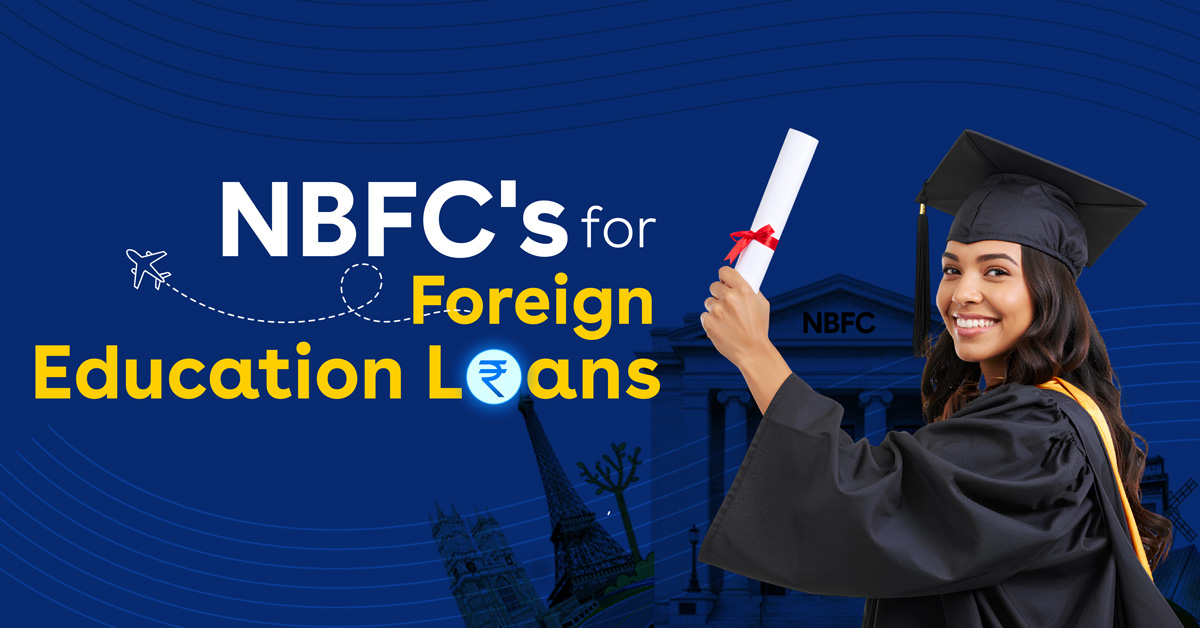Nov 18, 2025
Overseas Education Loan for Dubai: Types, Eligibility, Process, Benefits & More
We all know Dubai sells dreams, which are wrapped up in gold-plated ambition. It’s got those world-class universities, internship opportunities with Fortune 500 companies, and a skyline so stunning that could make your Instagram look like a luxury travel magazine! Everything seems picture-perfect until you flip to the ‘expenses’ page of that university brochure and suddenly find yourself mentally calculating which family asset could be liquidated first.
Honestly, it might sound unbelievable at first, but behind all those shiny skyscrapers, luxury malls, and fancy cars, Dubai is actually way more affordable for higher studies than most people think. And it becomes more accessible with some of the best bank for education loan!
Taking this forward, this guide breaks down the actual costs, clears up the confusion around overseas education loans, and shows you exactly how to fund your studies in Dubai without doing mental gymnastics over money. Because honestly, the only thing you should be stressing about is which internship offer to accept.
Table of Content
|
|
Cost of Education in Dubai
Let us first start with checking the expenses page of Dubai’s brochures and look at the real numbers behind studying there.
Tuition Fees
For bachelor’s degrees, international students typically pay between AED 40,000 and AED 80,000 per year (roughly $11,000 - $22,000).
Master’s programs often come in at AED 60,000 to AED 150,000 per year, especially at globally ranked campuses.
Living & Other Costs
Monthly living expenses (including rent, food, transport) for students average around AED 4,500 - 6,500 ($1,225 - $1,770) depending on lifestyle and accommodation.
Accommodation options vary greatly - Shared rooms can cost AED 3,000 - 5,000/month, while private studios in central areas may run AED 6,000 - 10,000/month.
Apart from these, there are visa costs, health insurance, books and study-related expenses which can add another 10,000 to 20,00 AED per year.
Cost of Education in Top Universities of Dubai
Dubai’s whole push toward globalization, an open economy, and an innovation-first mindset has completely flipped its higher education game. Because of this, a bunch of top universities from the UK, Australia, and other countries have opened their campuses right in the city. So, you are basically getting the same degree that students get abroad… just without paying more. Sounds a bit too good to be true? Check out the table below, and you will see yourself:
|
|
|
|
|
AED 63,000 – AED 95,000 |
|
|
AED 55,000 – AED 85,000 |
|
|
AED 100,000 – AED 130,000 |
|
|
AED 50,000 – AED 80,000 |
|
|
AED 90,000 – AED 120,000 |
|
|
AED 50,000 – AED 75,000 |
|
|
|
|
|
|
|
|
|
Now that you have seen the numbers, it is pretty clear that studying in Dubai doesn’t have to empty your bank account. The fees are genuinely manageable, and once you factor in an overseas education loan for Dubai, even the top universities start feeling surprisingly within reach. And hey, if you land a scholarship on top of that… that is basically the cherry on top. So, let us check out some of the most popular scholarships international students usually go for in Dubai.
Scholarships for International Students in Dubai
Dubai offers both government-funded and university-specific scholarships that can cover 10% to 100% of tuition fees, depending on merit and eligibility. Prestigious awards like the Mohammed Bin Rashid Al Maktoum Scholarship and grants from top universities such as Heriot-Watt University Dubai and Middlesex University Dubai make studying here more affordable.
However, with thousands of students from across the globe applying, securing a scholarship in Dubai feels like finding a parking spot near the Burj Khalifa during rush hour! That is exactly why relying solely on scholarships can be a bit of a gamble — great if you get one, but risky if you don’t. So instead of leaving your dreams to chance, why not plan smart? Keeping that in mind, let us talk about the best way to fund your education in Dubai.
Best Way to Fund Education in Dubai
When it comes to funding your higher education in Dubai, most students find themselves standing between two options: family savings, or the other is opting for an overseas education loan.
While self-funding may sound simple, it can quickly drain years of hard-earned savings and limit your family’s financial flexibility. On the other hand, an overseas education loan for Dubai allows you to pursue your dream university without putting immediate pressure on your finances. Overseas education loans help you stay focused on your studies while managing the costs smartly in the background.
Key Benefits of Taking an Overseas Education Loan for Dubai
When you look beyond scholarships and self-funding, taking an overseas education loan for Dubai often turns out to be the smartest and most sustainable choice. It doesn’t just make studying abroad possible — it makes it practical. Here is how opting for an education loan can actually work in your favor:
Comprehensive Coverage: Apart from covering just the tuition fees, overseas education loans extend to covering expenses such as accommodation, daily living expenses, travel, health insurance, and even study materials, ensuring your entire study journey is financially secure.
Ease on Family Finances: Instead of paying huge amounts upfront, with a loan, the family can maintain liquidity while you pay back in manageable instalments after graduation.
Tax Benefits: In India, the interest paid on overseas education loans qualifies for deductions under Section 80E, helping reduce your tax burden during repayment.
Flexible Repayment Options: Most lenders offer repayment tenures ranging from 7 to 15 years, often with moratorium periods that give you time to settle into a job before repayments start.
Builds Your Credit History: Timely repayment of your overseas education loan for Dubai helps establish a positive credit record, setting a strong foundation for future financial goals — be it a home, car, or business loan.
Now that you know the major benefits of taking an education loan for Dubai, let us look at the different types of lenders who can help turn your study abroad plans into reality.
Types of Loan Providers for Overseas Education Loan for Dubai
Choosing the right loan provider can make a huge difference in managing your finances. From public sector banks to private lenders and NBFCs, each offers unique benefits in terms of loan amount, interest rates, and repayment flexibility.
Here is a quick comparison to help you identify which type of lender might suit your study abroad plans best.
|
Category |
|
|
|
|
|
|
Bank Of Baroda Union Bank of India Bank of India Bank of Maharashtra Punjab National Bank Saraswat Co-operative Bank |
|
|
|
|
|
Axis Bank IDFC Bank Yes Bank |
|
|
|
|
|
Auxilo Edgro Poonawala Tata Capital Incred |
|
|
|
Okay, so you know who can give you the loan — but the next big question is, are you eligible for it? Let’s quickly look at the criteria most lenders expect you to meet.
Eligibility Criteria for Overseas Education Loan for Dubai
Before a bank or financial institution backs your dream to study in Dubai, they need assurance that you are ready, both academically and financially. So, overseas education loan eligibility is your checkpoint, where most lenders in India have a standard set of parameters that determine whether you qualify for an overseas education loan or not.
Citizenship: The applicant should be an Indian citizen with proof of residence.
Admission Offer: A confirmed admission letter from a recognized university or institution in Dubai is mandatory.
Academic Records: A strong academic background improves loan approval chances, especially for reputed universities.
Co-applicant Details: A parent, guardian, or spouse with a stable income and good credit history is generally required as a co-borrower.
Loan Amount & Repayment Eligibility: Students can typically borrow between Rs. 10 lakhs to Rs. 1.5 crores, depending on the lender, with repayment periods ranging from 7 to 15 years.
Documents Required for Overseas Education Loan for Dubai
Once you clear the eligibility stage, the next step is paperwork — the part that can either make or delay your loan approval. Preparing these documents early can help you stay ahead in the process:
Proof of Identity and Address (Passport, Aadhaar, PAN Card)
Academic Documents (Mark sheets, certificates, offer letter, entrance exam scores if applicable)
Proof of Admission and Fee Structure from the Dubai university
Income Proof of Co-applicant (Salary slips, ITRs, Form 16, or business income proof)
Bank Statements (Usually last six months)
Collateral Documents (if applying for a secured loan)
Always double-check your lender’s document checklist — even a missing signature or outdated document can delay approval by days.
Application Process for Overseas Education Loan for Dubai
Applying for an overseas education loan might seem complicated, but in reality, it is just about following a few clear steps in the right order. Here is how it usually goes:
Pre-Approval & Loan Counselling: Start by comparing lenders and checking your pre-approval eligibility. Many financial partners, like Élan Overseas Education Loans, help students understand their exact loan options before applying.
Submit Application & Documents: Fill out the loan application online or at the bank branch and submit the necessary documents.
Loan Evaluation & Sanction: The lender verifies your documents, evaluates your profile, and issues a sanction letter mentioning the approved loan amount and terms.
Disbursement: Once the student visa and admission are confirmed, the funds are transferred directly to the university account as per the fee schedule.
To speed up approval, maintain a clean credit record (for co-applicants), keep all documents scanned and ready, and apply at least 2–3 months before your course begins.
How Élan Loans Helps in Securing Overseas Education Loan for Dubai?
Once you have figured out your eligibility and gathered all the documents, the next big question is — how do you actually get that loan sanctioned smoothly and on time? That is where Élan Loans steps in, making the entire abroad education loan process simple, fast, and stress-free. Here is how they do it:
One Stop Loan Partner: Élan Loans brings together more than 20 reputed banks and NBFCs that give students a wide range of options to compare interest rates, loan types, and terms — all in one place. So, no need to run from one lender to another because Élan Loans simplifies it for you.
Personalized Loan Support: Every student gets a dedicated loan advisor who understands their financial background, course choice, and university requirements. They even guide you through lender selection, eligibility criteria, and suitable loan types to help you make the smartest choice.
Complete End-to-End Assistance: From checking eligibility to preparing documents, submitting applications, and tracking the sanction process, having Élan Loans feels like having a financial expert who never leaves your side.
Smart Guidance for Better Loan Outcomes: Élan’s experts offer practical insights on how to improve your approval chances, secure better interest rates, and manage loan repayment plans that align with your future income.
Fast, Hassle-Free Approvals: We all know that time is very crucial when applying for overseas studies. Élan Loans ensures quick turnaround times, helping you get loan approvals well before visa and fee payment deadlines — so you can focus on your Dubai dream, not the paperwork.
Remember when we said Dubai sells dreams wrapped in gold-plated ambition? Well, those dreams do need funds to become true! With the right overseas education loan, that mental calculation of yours about liquidating family assets? Yeah, you can skip that entirely.
And with trusted partners like Élan Overseas Education Loans, securing an overseas education loan for Dubai becomes less ‘mission impossible’ and more ‘mission accomplished.’ So go ahead - accept that internship offer, plan that weekend desert safari, and let the loan handle what it does best - keeping your Dubai dream funded, stress-free, and on track.
Overseas Education Loan for Dubai FAQs
1. Can international students work part-time in Dubai while studying?
Yes, international students enrolled at universities in Dubai’s free zones can work part-time for up to 20 hours per week during the semester and full-time during breaks, provided they obtain a work permit. This can help students manage living expenses while studying.
2. Are overseas education loans available for diploma or short-term programs in Dubai?
Most lenders offer education loans primarily for full-time degree programs like bachelor’s and master’s courses. However, some banks and NBFCs may also consider financing recognized diploma or professional certification programs on a case-by-case basis.
3. Do Indian lenders require collateral for loans to study in Dubai?
It depends on the loan amount and the lender. Public banks generally require collateral for loans above Rs. 7.5 lakhs, while private banks and NBFCs may offer unsecured loans up to Rs. 50 lakhs or more for reputed universities in Dubai.
4. How is the loan amount disbursed for universities in Dubai?
The approved loan amount is typically sent directly to the university as per the fee structure. In some cases, a portion may be disbursed to the student’s account to cover living expenses, accommodation, or travel costs.
5. Is it possible to get a loan for Dubai if the student’s co-applicant has a low credit score?
Yes, though it may reduce approval chances or lead to higher interest rates. Students can improve eligibility by adding another co-applicant with a stronger financial profile or offering collateral for the loan.
6. What happens if a student changes or defers their course after loan approval?
If a student changes or defers their admission, the lender must be informed immediately. The sanction may need to be revised, and disbursement is usually postponed until the new admission or course confirmation is provided.

- Share this Article
Articles on Overseas Education Loans

NBFC Foreign Education Loans vs Banks
As the number of Indian students wishing to go abroad increases..Feb 02, 2026

Pre Visa vs Post Visa Study Abroad Loan Disbursement
We all can recall the scenes from heist movies...Jan 30, 2026

How Spring 2026 Intake Impacts Abroad Education Loans
With the commencement of 2026, the Spring intake starts....Jan 30, 2026

 Login
Login